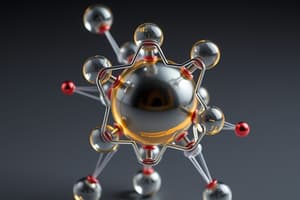Podcast
Questions and Answers
What is the primary characteristic that distinguishes solids from liquids and gases in the particle model of matter?
What is the primary characteristic that distinguishes solids from liquids and gases in the particle model of matter?
- Particles in solids can flow easily.
- Particles in solids are evenly spaced apart.
- Particles in solids are tightly packed and vibrate in place. (correct)
- Particles in solids have higher energy.
When considering changes in states of matter, which phase transition occurs when a liquid turns into a solid?
When considering changes in states of matter, which phase transition occurs when a liquid turns into a solid?
- Sublimation
- Condensation
- Melting
- Freezing (correct)
In a solution, what is the component called that is present in the greatest amount?
In a solution, what is the component called that is present in the greatest amount?
- Colloid
- Suspension
- Solvent (correct)
- Solute
Which of the following accurately describes how to express the concentration of a solution by percent by volume?
Which of the following accurately describes how to express the concentration of a solution by percent by volume?
What does a litmus indicator react to in a solution?
What does a litmus indicator react to in a solution?
Flashcards are hidden until you start studying
Study Notes
Particle Model of Matter
- Matter is composed of tiny particles that are constantly in motion.
- The arrangement and movement of these particles differ in solids, liquids, and gases.
Particle Movements of Matter
- In solids, particles vibrate in fixed positions but do not move freely.
- In liquids, particles are closely packed but can slide past each other, allowing flow.
- In gases, particles are far apart and move rapidly in all directions.
Diagrams of the Three Phases of Matter
- Solid: Particles are tightly packed in a regular arrangement.
- Liquid: Particles are close together but not in a fixed arrangement, allowing them to flow.
- Gas: Particles are spaced widely apart in a random arrangement.
Phase Changes
- Changes in temperature or pressure cause matter to transition between solid, liquid, and gas phases.
- Common phase changes include melting (solid to liquid), freezing (liquid to solid), evaporation (liquid to gas), and condensation (gas to liquid).
Scientific Method
- A systematic process for experimentation to explore observations and answer questions.
- Steps often include observation, hypothesis formulation, experimentation, data collection, and conclusion.
Measuring Using Standard Units
- Standard units provide a consistent way to quantify measurements in science.
- Common units include meters (length), kilograms (mass), and liters (volume).
Solute and Solvent
- A solute is a substance that is dissolved in a solvent, which is the substance that does the dissolving.
- Solutions are homogenous mixtures formed when solutes dissolve in solvents.
Percent by Volume
- A common way to express the concentration of a solution.
- Calculated as (volume of solute / total volume of solution) × 100%.
Solubility
- The ability of a solute to dissolve in a solvent at a given temperature and pressure.
- Solubility varies for different substances and is often affected by temperature.
Reaction of Solutions in Litmus Indicator
- Litmus paper is used to test acidity or alkalinity; red indicates acidic solutions, while blue indicates basic solutions.
- Neutral solutions maintain the original color of litmus paper.
Proper Use and Handling of Science Equipment
- Always follow safety guidelines when using laboratory equipment.
- Use personal protective equipment (PPE) such as gloves and goggles.
- Ensure calibration and cleanliness of instruments for accurate measurements.
Studying That Suits You
Use AI to generate personalized quizzes and flashcards to suit your learning preferences.




